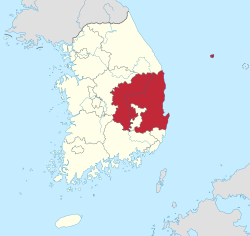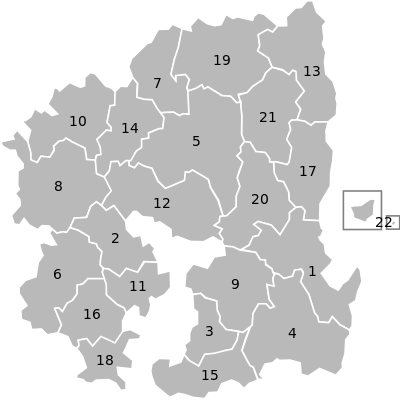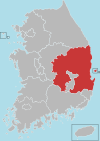North Gyeongsang Province
North Gyeongsang Province
경상북도 | |
|---|---|
| Korean transcription(s) | |
| • Hangul | 경상북도 |
| • Hanja | 慶尙北道 |
| • McCune‑Reischauer | Kyŏngsangbuk-to |
| • Revised Romanization | Gyeongsangbuk-do |
 | |
| Country | |
| Region | Yeongnam |
| Largest city | Pohang |
| Capital | Andong |
| Subdivisions | 10 cities; 12 counties |
| Government | |
| • Governor | Lee Cheol-woo (People Power) |
| Area | |
• Total | 19,030 km2 (7,350 sq mi) |
| • Rank | 1st |
| Population (October, 2014)[1] | |
• Total | 2,546,960 |
| • Rank | 3rd |
| • Density | 141.7/km2 (367/sq mi) |
| Demonym | Gyeongbukite |
| Metropolitan Symbols | |
| • Flower | Crape-myrtle |
| • Tree | Zelcova |
| • Bird | Common heron |
| GDP | |
| • Total | KR₩ 115 trillion US$ 92 billion (2022) |
| ISO 3166 code | KR-47 |
| Dialect | Gyeongsang |
| Website | Official website (English) |
North Gyeongsang Province (Korean: 경상북도; RR: Gyeongsangbuk-do, Korean pronunciation: [kjʌŋ.saŋ.buk̚.t͈o]) is a province in eastern South Korea, and with an area of 18,420 km2 (7,110 sq mi), it is the largest province in the Korean peninsula. The province was formed in 1896 from the northern half of the former Gyeongsang province, and remained a province of Korea (as Keishōhoku-dō during Japanese rule) until the country's division in 1945, then became part of South Korea.
Daegu was the capital of North Gyeongsang Province between 1896 and 1981, but has not been a part of the province since 1981. In 2016, the provincial capital moved from Daegu to Andong.[3]
History
[edit]The 1,000-year-old Silla Kingdom flourished and unified the previous three kingdoms. The area was named Gyeongsang-do in 1314 during the Goryeo Dynasty. In 1896, during the Joseon Dynasty, the area was renamed Gyeongsangbuk-do as 13 roads were reorganized. The current administrative district was reorganized with the reorganization of Bu, Gun, and Myeon in 1914.[4]
Geography and climate
[edit]The province is part of the Yeongnam region, bordered to the south by South Gyeongsang Province, to the west by North Jeolla and North Chungcheong Provinces, and to the north by Gangwon Province. It is largely surrounded by mountains: the Taebaek Mountains in the east and the Sobaek Mountains in the west.[citation needed]
Culture
[edit]Cuisine
[edit]Andong Sikhye, a local food from Andong and northern North Gyeongsang Province, is essential for entertaining guests on Seollal or feast days. Unlike ordinary Sikhye, it is red with Chili powder, has more grains of rice, and less soup.[5]
Tourism
[edit]North Gyeongsang Province is the homeland of the former kingdom of Silla and has retained much of its cultural tradition. A number of artists, political leaders and scholars have come from the province.
-
View of Hahoe Folk Village in Andong
-
View of Yangdong Folk Village in Gyeongju
Demographics
[edit]| Year | Pop. | ±% p.a. | ||
|---|---|---|---|---|
| 1980 | 3,102,060 | — | ||
| 1990 | 2,766,797 | −1.14% | ||
| 2000 | 2,724,931 | −0.15% | ||
| 2010 | 2,600,032 | −0.47% | ||
| 2015 | 2,680,294 | +0.61% | ||
| 2020 | 2,644,757 | −0.27% | ||
| ||||
| Source: Citypopulation[6] | ||||
Cities, towns, and villages
[edit]| Rank | Pop. | ||||||||
|---|---|---|---|---|---|---|---|---|---|
 Pohang  Gumi |
1 | Pohang | 501,109 |  Gyeongsan  Gyeongju | |||||
| 2 | Gumi | 416,603 | |||||||
| 3 | Gyeongsan | 283,733 | |||||||
| 4 | Gyeongju | 261,778 | |||||||
| 5 | Andong | 159,412 | |||||||
| 6 | Gimcheon | 139,145 | |||||||
| 7 | Chilgok | 115,756 | |||||||
| 8 | Yeongju | 103,818 | |||||||
| 9 | Yeongcheon | 100,353 | |||||||
| 10 | Sangju | 95,473 | |||||||
Religion
[edit]Religion in North Gyeongsang (2015)[8]
According to the census of 2015, 25.3% followed Buddhism and 18.5% followed Christianity (13.3% Protestantism and 5.2% Catholicism). 55.4% of the population is irreligious.[8]
Administrative divisions
[edit]Gyeongsangbuk-do is divided into 10 cities (si) and 12 counties (gun). The names below are given in English, hangul, and hanja. Gyeongsang do is originated from Gyeongju & Sangju old city of Gyeong+Sang from Joseon Dynasty (1392–1910). Do means road to 8 directional road from Seoul. Pohang is Korean steel production hub, Gumi is electronics capital of South Korea.

| Map | # | Name | Hangul | Hanja | Population (2024)[9] | Subdivisions |
|---|---|---|---|---|---|---|

| ||||||
| — Specific City — | ||||||
| 1 | Pohang | 포항시 | 浦項市 | 492,041 | 2 ilban-gu — 4 eup, 10 myeon, 15 haengjeong-dong | |
| — City — | ||||||
| 2 | Gumi | 구미시 | 龜尾市 | 404,691 | 2 eup, 6 myeon, 19 haengjeong-dong | |
| 3 | Gyeongsan | 경산시 | 慶山市 | 266,951 | 2 eup, 6 myeon, 7 haengjeong-dong | |
| 4 | Gyeongju | 경주시 | 慶州市 | 245,365 | 4 eup, 8 myeon, 11 haengjeong-dong | |
| 5 | Andong | 안동시 | 安東市 | 153,348 | 1 eup, 13 myeon, 10 haengjeong-dong | |
| 6 | Gimcheon | 김천시 | 金泉市 | 135,767 | 1 eup, 14 myeon, 7 haengjeong-dong | |
| 7 | Yeongju | 영주시 | 榮州市 | 99,309 | 1 eup, 9 myeon, 9 haengjeong-dong | |
| 8 | Sangju | 상주시 | 尙州市 | 92,452 | 1 eup, 17 myeon, 6 haengjeong-dong | |
| 9 | Yeongcheon | 영천시 | 永川市 | 99,034 | 1 eup, 10 myeon, 5 haengjeong-dong | |
| 10 | Mungyeong | 문경시 | 聞慶市 | 67,544 | 2 eup, 7 myeon, 5 haengjeong-dong | |
| — County — | ||||||
| 11 | Chilgok County | 칠곡군 | 漆谷郡 | 108,119 | 3 eup, 5 myeon | |
| 12 | Uiseong County | 의성군 | 義城郡 | 56,777 | 1 eup, 17 myeon | |
| 13 | Uljin County | 울진군 | 蔚珍郡 | 46,112 | 2 eup, 8 myeon | |
| 14 | Yecheon County | 예천군 | 醴泉郡 | 45,948 | 1 eup, 11 myeon | |
| 15 | Cheongdo County | 청도군 | 淸道郡 | 43,787 | 2 eup, 7 myeon | |
| 16 | Seongju County | 성주군 | 星州郡 | 44,824 | 1 eup, 9 myeon | |
| 17 | Yeongdeok County | 영덕군 | 盈德郡 | 40,213 | 1 eup, 8 myeon | |
| 18 | Goryeong County | 고령군 | 高靈郡 | 35,281 | 1 eup, 7 myeon | |
| 19 | Bonghwa County | 봉화군 | 奉化郡 | 33,936 | 1 eup, 9 myeon | |
| 20 | Cheongsong County | 청송군 | 靑松郡 | 26,432 | 1 eup, 7 myeon | |
| 21 | Yeongyang County | 영양군 | 英陽郡 | 18,259 | 1 eup, 5 myeon | |
| 22 | Ulleung County | 울릉군 | 鬱陵郡 | 10,557 | 1 eup, 2 myeon | |
Economy
[edit]In October 2022, the province announced its plan to make the province a leading area centered on the domestic metaverse. It is also a specialized complex for semiconductor and secondary battery national high-tech strategic industries.[10]
Industry
[edit]The service industry accounts for 58.3%, mining manufacturing industry account for 30.6%, construction account for 10.5%, and agriculture and fishing account for 0.6%. Mobile convergence, digital device parts, and energy material parts are major specialized industries.[11]
Transportation
[edit]Railway
[edit]
The railway stations in North Gyeongsang Province are as follows:
- Andong station
- Apo station
- Bonghwa station
- Cheongdo station
- Daesin station
- Gimcheon station
- Gimcheon (Gumi) station
- Gumi station
- Gyeongju station
- Gyeongsan station
- Hwabon station
- Jeomchon Station
- Jicheon station
- Jikjisa station
- Jinyeong station
- Moryang station
- Mungyeong station
- Munsu station
- Namseonghyeon station
- Pohang station
- Punggi station
- Sagok station
- Samseong station
- Sinam station
- Sindong station
- Singeo station
- Uiseong station
- Waegwan station
- Yangmok station
- Yeongcheon station
- Yeongdeok station
- Yeongju station
- Yeonhwa station
Recent discoveries
[edit]In September 2021, archaeologists announced the discovery of 1500 years-old woman skeleton with a necklace and a bracelet in North Gyeongsang Province. The remains of a 135-centimeter-tall woman, who is estimated to have died in her 20s, were discovered along with the bones of animals such as horses and cows, as well as earthenware.[12][13][14][15]
Notable people from North Gyeongsang Province
[edit]
- Lee Myung-bak, Former President of South Korea
- Han Duck-soo, the Prime minister of South Korea
- Cho Tae-yul, 41st Foreign Minister of South Korea
- Taeyeon (born Kim Tae-yeon 1989), singer and member of Girls' Generation
- Kwon Yong-jin, South Korean politician
- Kim Boo-kyum, South Korean politician
- Park Chung Hee, Former South Korean President
- Ahn Ji-young, a member of Korean band Bolbbalgan4
- Yoo Jae-ha, South Korean singer and songwriter
See also
[edit]References
[edit]- ^ "연령별 인구현황". Archived from the original on 29 November 2014. Retrieved 1 October 2015.
- ^ "2022년 지역소득(잠정)". www.kostat.go.kr.
- ^ 도로망 구축 10조 원, 경북도청 신청사 지역의 위용(사진). HuffPost (in Korean). 15 February 2016. Retrieved 23 February 2016.
- ^ "History". Gyeongsangbuk-do.
- ^ "Andong sweet rice punch (안동식혜)". Korea Tourism Organization.
- ^ "South Korea: Provinces".
- ^ "South Korea: Provinces".
- ^ a b "2015 Census – Religion Results" (in Korean). KOSIS KOrean Statistical Information Service. Retrieved 10 March 2021.
- ^ 2013년 1분기 주민등록인구현황 (in Korean). North Gyeongsang Province. March 2013. Retrieved 10 June 2013.
- ^ "North Gyeongsang Province aims to position itself as hub of metaverse". The Korea Times. 19 October 2023.
- ^ "Gyeongsangbuk-do Province". The Association of Nort East Asia Regional Governments.
- ^ "More human sacrifice evidence unearthed at Gyeongju palace site". koreatimes. 7 September 2021. Retrieved 11 September 2021.
- ^ "Human Remains Found in Foundation of Silla Dynasty Palace - Archaeology Magazine". www.archaeology.org. 9 September 2021. Retrieved 11 September 2021.
- ^ Seung-hyun, Song (7 September 2021). "More evidence unearthed of Silla-era human sacrifice". The Korea Herald. Retrieved 11 September 2021.
- ^ "Remains from human sacrifices unearthed at Wolseong Palace in Gyeongju". english.hani.co.kr. Retrieved 11 September 2021.
External links
[edit]- Official website (in English)
- (in French) Alsace/Gyeongsangbuk-do
 North Gyeongsang Province travel guide from Wikivoyage
North Gyeongsang Province travel guide from Wikivoyage












